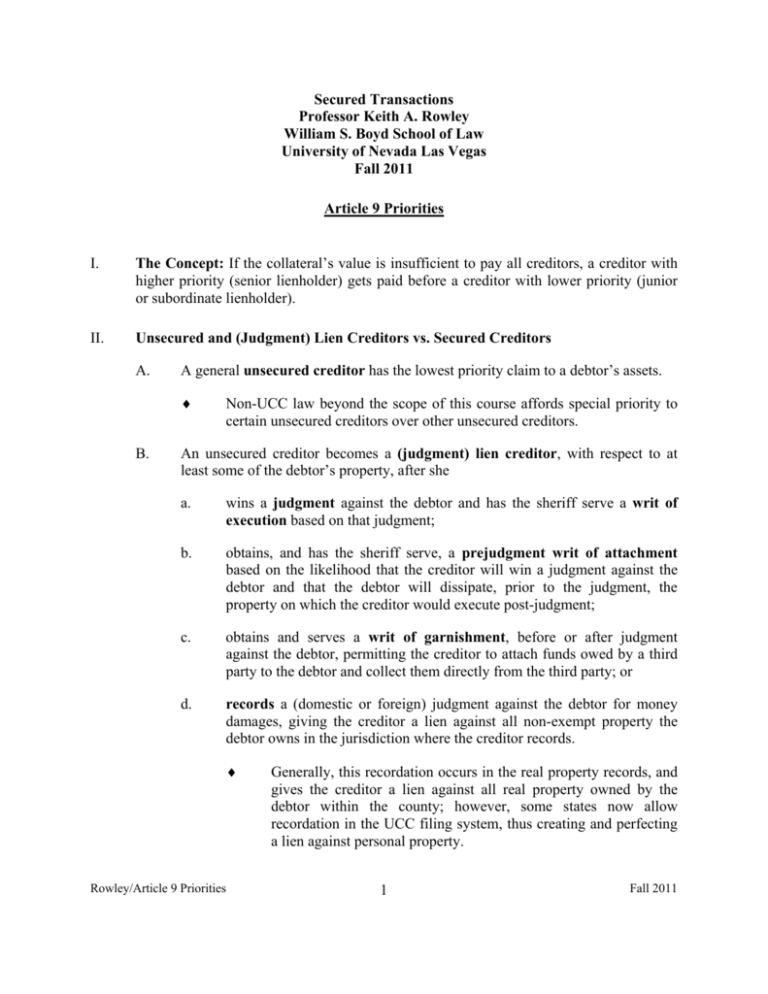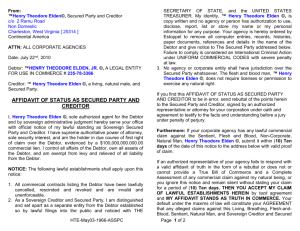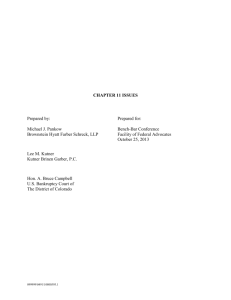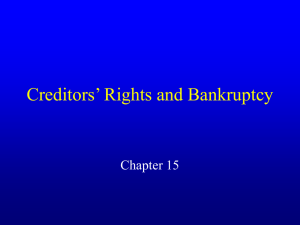Article 9 Priorities - UNLV - William S. Boyd School of Law
advertisement

Secured Transactions Professor Keith A. Rowley William S. Boyd School of Law University of Nevada Las Vegas Fall 2011 Article 9 Priorities I. The Concept: If the collateral’s value is insufficient to pay all creditors, a creditor with higher priority (senior lienholder) gets paid before a creditor with lower priority (junior or subordinate lienholder). II. Unsecured and (Judgment) Lien Creditors vs. Secured Creditors A. A general unsecured creditor has the lowest priority claim to a debtor’s assets. ♦ B. Non-UCC law beyond the scope of this course affords special priority to certain unsecured creditors over other unsecured creditors. An unsecured creditor becomes a (judgment) lien creditor, with respect to at least some of the debtor’s property, after she a. wins a judgment against the debtor and has the sheriff serve a writ of execution based on that judgment; b. obtains, and has the sheriff serve, a prejudgment writ of attachment based on the likelihood that the creditor will win a judgment against the debtor and that the debtor will dissipate, prior to the judgment, the property on which the creditor would execute post-judgment; c. obtains and serves a writ of garnishment, before or after judgment against the debtor, permitting the creditor to attach funds owed by a third party to the debtor and collect them directly from the third party; or d. records a (domestic or foreign) judgment against the debtor for money damages, giving the creditor a lien against all non-exempt property the debtor owns in the jurisdiction where the creditor records. ♦ Rowley/Article 9 Priorities Generally, this recordation occurs in the real property records, and gives the creditor a lien against all real property owned by the debtor within the county; however, some states now allow recordation in the UCC filing system, thus creating and perfecting a lien against personal property. 1 Fall 2011 C. Priority Among (Judgment) Lien Creditors: Governed by state statutes, lien creditors generally take priority on a “first-come, first-served” basis as follows: 1. Majority Rule: First to levy (repossess or disable) takes priority; 2. Minority Rule: First to deliver the writ of execution (under the auspices of which the sheriff will levy) to the sheriff takes priority. D. (Judgment) Lien Creditors vs. Purchase Money Secured Creditors: A PMSI that attaches before the lien creditor can obtain its lien will take priority over the lien as long as the secured creditor perfects by filing within 20 days of attachment. § 9-317(e). E. (Judgment) Lien Creditors vs. Non-Purchase Money Secured Creditors: Priority depends on which happens first: F. 1. The creditor becomes a lien creditor (as described above), or 2. The secured creditor perfects its interest or files a valid financing statement and later perfects. § 9-317(a)(2). (Judgment) Lien Creditors vs. Future Advances: What happens when an already-perfected secured creditor lends additional funds to a debtor (claiming the same collateral in which the secured creditor is already perfected) after a lien creditor’s lien attaches? The secured creditor has priority with respect to any such future advance it makes 1. within 45 days after the lien creditor’s lien attached, regardless of whether the secured creditor about the lien’s existence when it made the advance, § 9-323(b); 2. more than 45 days after the lien creditor’s lien attached, if the secured creditor did not know about the lien when it made the advance, § 9323(b)(1); and 3. more than 45 days after the lien creditor’s lien attached, if the advance is “pursuant to a commitment” that the secured creditor entered into before it knew about lien, even if the secured creditor knew about the lien when it made the advance, § 9-323(b)(2). ♦ § 9-323(b) extends the secured creditor’s priority over an intervening lien creditor to “nonadvances” (e.g., costs of collection, attorneys’ fees, etc.), provided for in the secured creditor’s security agreement with the debtor, but which the secured creditor does not incur until after the lien creditor’s lien attaches. See § 9-323 cmt. 4. Rowley/Article 9 Priorities 2 Fall 2011 III. Statutory Lien Creditors vs. Secured Creditors A. B. Examples of Statutory Liens 1. Mechanic’s and Materialman’s Liens in favor of a person who performs labor upon or furnishes materials used in erecting, altering, or repairing improvements to real property; against both the improvements and the real property (see, e.g., N.R.S. §§ 108.221 to 108.246) 2. Artisan’s Lien in favor of a person skilled in some trade, craft, or art; against the personalty the artisan created or repaired (see, e.g., N.R.S. §§ 108.249 & 108.370) 3. Garage Keeper’s Lien in favor of persons who repair and store vehicles; against the vehicle (see, e.g., N.R.S. §§ 108.270 to 108.360) 4. Cleaner’s & Launderer’s Lien a lien in favor of a person who cleans or launders clothes; against the debtor’s clothes in the cleaner’s possession (see, e.g., N.R.S. §§ 108.770 to 108.820) 5. Hospital Lien in favor of persons providing medical care; against any amount the patient (or her estate) recovers from the person (or his insurer) whose acts or omissions caused the patient’s hospitalization (see, e.g., N.R.S. §§ 108.590 to 108.668) 6. Veterinarian’s Lien in favor of persons who care for, feed, and keep animals; against the animal (see, e.g., CAL. CIV. CODE § 3051) 7. Landlord’s Lien in favor of a landlord; against either (1) the debtor’s personalty located on the leased premises or (2) all of the debtor’s personalty (see, e.g., N.R.S. §§ 108.270 to 108.360) 8. Attorney’s (Charging) Lien in favor of an attorney owed unpaid fees and expenses; against the client’s recovery from a third person (see, e.g., N.R.S. § 18.015) Common Law “Statutory” Liens: Many jurisdictions recognized possessory common law liens in favor of artisans, materialmen, mechanics, and others long before these liens were codified – and many continue to recognize common law or equitable liens in addition to their statutory counterparts. ♦ For example, Nevada law provides a retaining lien attaching to the client’s documents and other property in an attorney’s possession. See Argentena Consolidated Mining Co. v. Jolley Urga Wirth Woodbury & Standish, 216 P.3d 779 (Nev. 2009). Rowley/Article 9 Priorities 3 Fall 2011 C. Priority of Statutory Liens 1. Three Basic Non-Article 9 Priority Schemes a. “First in Time, First in Right”: Priority based on whether the statutory lien arises or the security interest perfected first; ♦ 2. IV. If a first-in-time rule applies, the statute should indicate how and when the statutory lien arises. b. Secured Creditor Wins regardless of when the statutory lien creditor’s lien arose; or c. Statutory Lien Creditor Wins regardless of when the secured creditor perfected its interest. § 9-333(b): In the absence of a contrary statute, a statutory lien creditor has priority over an earlier-perfected secured creditor if a. the statutory lien creditor furnishes services or materials in the ordinary course of its business; b. the lien is for (only) the price of the services and materials; c. the statutory lien creditor possesses the liened personalty; and d. the liened property is property with respect to which the statutory lien creditor furnished the goods or services giving rise to the lien. Secured Creditors vs. Secured Creditors A. The Basics 1. Between two or more unperfected secured creditors, the first to attach has priority. § 9-322(a)(3). 2. A perfected secured creditor has priority over an unperfected secured creditor. § 9-322(a)(2). 3. Between two or more perfected secured creditors, the first to file (and later perfect) or to perfect has priority and retains its priority as long as its perfection never lapses. § 9-322(a)(1). ♦ Rowley/Article 9 Priorities As long as the security interest eventually attaches, the secured creditor has priority as of the date of the filing. § 9-322 cmt. 5. 4 Fall 2011 B. C. D. E. Priority in After-Acquired Property 1. A security interest in after-acquired property attaches when the debtor acquires the property. § 9-203(b). 2. As against other SCs, the after-acquired lender’s priority dates from the time of filing. § 9-322(a)(1). Priority of Future Advances 1. Perfected by Filing: Advances by a secured creditor who properly perfected by filing have priority based on when the secured creditor filed (or otherwise perfected and then filed without lapse), regardless of whether the secured creditor makes the advance pursuant to a commitment. § 9-323(a) & cmt. 3. 2. Otherwise Perfected: Advances by a secured creditor who properly perfected by some method other than filing have priority based on when the secured creditor made the advance, unless the secured creditor makes the advance pursuant to a commitment it entered into before or while the security interest was properly perfected by another method. § 9-323(a)(1)(2) & cmt. 3. Priority in Goods the Debtor Transfers: As a general rule, a perfected security interest in collateral in a transferor’s hands takes priority over a perfected security interest in the same collateral in the transferee’s hands if 1. the transferor granted the competing security interest, § 9-325(a)(1); 2. the competing security interest was perfected when the transferee acquired the collateral, § 9-325(a)(2) & cmt. 4; and 3. the prior-perfected security interest did not lapse at any time after the transferee acquired the collateral, § 9-325(a)(3) & cmt. 5. Priority in Certificate-of-Title Goods: If a state issues a certificate of title covering goods subject to a security interest perfected in another jurisdiction that the certificate of title does not reflect, the undisclosed prior-perfected security interest yields priority to a conflicting security interest perfected by notation on the new certificate of title unless the later-perfected secured creditor knows about the prior-perfected security interest. § 9-337(2). Rowley/Article 9 Priorities 5 Fall 2011 V. Special Priority Rules for Non-Fixture Personal Property A. Purchase Money Priority 1. General Rule: A PMSI in collateral other than inventory (or livestock) has priority over a conflicting security interest in the same collateral – even one perfected before the PMSI arose – if the PMSI is perfected no later than 20 days after the debtor possesses the collateral. § 9-324(a). 2. PMSI Priority in Inventory (or Livestock): The across-the-board 20-day “grace period” in § 9-324(a) does not apply if the purchase-money collateral is inventory (or livestock). Instead, a PMSI in inventory (or livestock) has priority over an earlier-perfected security interest only if: 3. a. The purchase-money lender (“PML”) perfects no later than when the debtor receives possession of the collateral; and b. The PML notifies the earlier-perfected secured creditor, no more than five years before the debtor takes possession, that the PML expects to acquire a PMSI in the collateral. §§ 9-324(b) & (d). ♦ A typical provision in a non-PMSI inventory loan prohibits liens against inventory (or livestock) other than that of the inventory (or livestock) lender. If the inventory (or livestock) lender receives the requisite notice from the PML, it will know the debtor is about to default on the inventory loan. ♦ If the earlier-perfected secured creditor does not receive notice, then the debtor is still in default and the earlierperfected secured creditor can avoid the “purchase money” treatment of the PML’s loan. Competing PMSIs: If two or more creditors have perfected PMSIs in the same collateral, a. a seller’s PMSI takes priority over an enabling lender’s PMSI, § 9324(g)(1); and b. conflicts between two or more enabling lenders’ PMSIs are resolved according to § 9-322(a). Rowley/Article 9 Priorities 6 Fall 2011 B. Priority in Intangibles Perfectible by Control 1. Deposit Accounts a. Control vs. Other Perfection Methods: A deposit account security interest perfected by control has priority over all security interests perfected by a method other than control. § 9-327(1). b. Control vs. Control i. General Rule: The first security interest perfected by control generally has priority over all other security interests subsequently perfected by control. § 9-327(2). ii. However, A). a bank maintaining a deposit account in which it has a security interest has priority over a secured creditor that perfects by means of a deposit account control agreement, § 9-327(3); and B). a secured creditor that becomes an accountholder of its deposit account collateral has priority over the bank maintaining the deposit account, § 9-327(4), and everyone else over whom that bank has priority. c. Transferee of Funds: Any recipient of funds from a deposit account takes them free of any security interest in the deposit account unless the transferee colludes with the debtor to violate the secured creditors’ rights by receiving the funds. § 9-332(b). d. Bank’s Right to Recoupment or Set-Off: The bank maintaining a deposit account in which one or more parties (including itself, see § 9-340 cmt. 3) has a security interest may exercise any right of recoupment or set-off that non-Article 9 law affords it, Rowley/Article 9 Priorities i. even if doing so seems to circumvent a secured creditor’s priority, § 9-340(a) & cmt. 2; ii. unless the secured creditor whose priority the bank’s set-off would circumvent perfected by becoming an accountholder of the deposit account, § 9-340(c). 7 Fall 2011 2. Investment Property a. Control vs. Other Perfection Methods: A security interest in investment property perfected by control has priority over a security interest perfected by any other means. § 9-328(1). b. Control vs. Control: The rules vary depending on the type of investment property. i. ii. iii. Securities A). The first security interest perfected by control has priority over all other security interests. § 9-328(2). B). A security interest in a registered certificated security perfected by delivery under § 9-313(a) has priority over all other security interests perfected by any means other than control. § 9-328(5). Securities Entitlement: As a general rule, priority goes to the first secured creditor to perfect by A). becoming the person for whom/which a securities account is maintained if, under § 8-106(d)(1), the secured creditor perfects by becoming the entitlement holder, § 9-328(2)(B)(i); B). obtaining the securities intermediary’s agreement to comply with the secured party’s entitlements orders if, under § 8-106(d)(2), by obtaining a securities account control agreement, § 9-328(2)(B)(ii); or C). a third party gaining or acknowledging control, in accordance with § 8-106(d)(3), on the secured party’s behalf. § 9-328(2)(B)(iii). ♦ Exception: A securities intermediary maintaining a securities entitlement or securities account in which it has a security interest has priority over all other secured creditors. § 9-328(3). Commodity Contract A). Rowley/Article 9 Priorities A commodity intermediary carrying a commodity contract in which it has a security interest has priority over all other secured creditors. § 9-328(4). 8 Fall 2011 B). 3. C. Otherwise, priority goes to the first secured creditor to perfect by obtaining the debtor’s and commodity intermediary’s agreement that the commodity intermediary will apply any value distributed on account of the commodity contract as the secured party directs without the debtor’s further consent. §§ 9-106(b)(2) & 9-328(2)(C). Letter-of-Credit Rights a. Control vs. Other Perfection Methods: A security interest in a letter-of-credit right perfected by control has priority over all security interests perfected by any other method. § 9-329(1). b. Control vs. Control: The first security interest perfect by control of letter-of-credit rights has priority over all competing security interests subsequently perfected by control. § 9-329(2). Priority in “Quasi-Intangibles” Perfectible by Possession 1. Chattel Paper: A security interest in chattel paper perfected by possession or control in good faith, for value, and in the ordinary course of the secured creditor’s business has priority a. over a perfected security interest in the same chattel paper as proceeds of inventory in which the competing claimant had a perfected security interest when the proceeds arose, provided that the chattel paper does not indicate that it has been assigned to anyone other than the non-proceeds secured creditor, § 9-330(a); b. over all other perfected security interests in the same chattel paper, provided that the secured creditor did not know that perfecting its interest violated the rights of any other party, § 9-330(b); and c. in any proceeds arising from the chattel paper to the extent that Rowley/Article 9 Priorities i. § 9-322 affords it priority in the proceeds, ii. the proceeds are specific goods covered by the chattel paper or cash proceeds of those goods, or iii. § 9-327 provides otherwise with regard to proceeds held in a deposit account, § 9-330(c). 9 Fall 2011 D. 2. Instruments: Subject to § 9-331(a), a security interest in an instrument perfected by possession, in good faith, for value, and not knowing that perfecting its interest violated the rights, has priority over a security interest perfected by any means other than possession. § 9-330(d). 3. Money: A security interest in money perfected by possession has priority over any other security interest claimed in the money; however, a transferee of money (e.g., a cash seller, a gift recipient) takes free of any security interest(s) in the money unless the transferee colludes with the debtor to violate a secured party’s rights. § 9-332(a). Priority in Commingled Goods and Accessions 1. When collateral, or a portion thereof, becomes part of a product or mass, a. if the collateral loses its identity in the mass, the security interest continues in the mass, § 9-336(c); but, b. if the collateral does not lose its identity, then the security interest continues in the collateral, § 9-335(a), but does not extend to the product unless the collateral description in the accession lender’s security agreement covers the product, see § 9-335 cmt. 5. 2. If more than one secured creditor has a perfected interest in a commingled mass under § 9-336(c), each perfected secured creditor is entitled to equal priority based on the cost of the collateral to which each interest originally attached relative to the value of the mass. § 9-336(f)(2). 3. If more than one secured creditor has a perfected interest in an accession, priority with respect to the accession is determined by the basic priority rules between secured creditors. See § 9-335(c) & cmt. 6. 4. Also subject to the exception below, if one or more secured creditor has a perfected interest in a product containing an accession and one or more secured creditor has a perfected interest in the accession, priority with respect to the accession is determined by the basic priority rules between secured creditors. See id. & ex. 3. 5. Certificate of Title Exception: If a secured creditor has a perfected interest only in an accession under § 9-335, its interest will be subordinate to a perfected interest in the product if the interest in the product was perfected under a certificate of title statute. § 9-335(d). 6. In all other cases, general priority rules determine the priority of a security interest in collateral which becomes commingled or an accession. See §§ 9-335(c) & 9-336(e). Rowley/Article 9 Priorities 10 Fall 2011 VI. Priority in Fixtures A. Key Terms 1. Encumbrance: A right, other than an ownership interest, in real property – including mortgages and nonconsensual liens on real property. § 9102(a)(32). 2. Mortgage: A security interest in real property and improvements securing an obligation to pay or perform, § 9-102(a)(55), typically perfected by recording the mortgage in the county real property records where the subject realty is located, see, e.g., N.R.S. § 111.310(1). 3. 4. ♦ Construction Mortgage: A mortgage in favor of a mortgagee extending credit to a mortgagor to pay for the construction of improvements to real property. § 9-334(h). ♦ A mortgage (including a construction mortgage) typically gives the mortgagee priority as of the date it records the mortgage. Construction Lien: A lien against real property and improvements in favor of a party providing construction goods or services on credit, see, e.g., N.R.S. § 108.222, typically perfected by filing a notice of lien in the county real property records where the subject realty is located, see, e.g., N.R.S. § 108.226. ♦ A statutory construction lien typically gives the lienholder priority as of the date it commences construction or provides goods used in construction. ♦ A lien against real property and improvements obtained by judicial process typically gives the lienholder priority as of the date it records notice of the lien. Fixture Filing: A financing statement evidencing a security interest in a fixture, § 9-201(a)(40), filed in the county real property records where the realty to which the fixture is attached is located, § 9-501(a)(1)(B). ♦ A fixture filing typically gives the secured creditor priority as of the date it files the financing statement. ♦ Note that a fixture filing only encumbers the fixture; whereas a construction lien or a mortgage in favor of a fixture provider encumbers both the fixture and the realty. Rowley/Article 9 Priorities 11 Fall 2011 B. Fixtures: General Priority Rules 1. A construction mortgage recorded before a good becomes a fixture has priority over a security interest in the fixture if the good becomes a fixture before construction is completed. § 9-334(h). 2. A perfected security interest in a fixture has priority over a (construction) mortgage or a statutory (construction) lien if 3. a. the debtor has a recorded interest in or possesses the realty; and b. the secured creditor perfected by a fixture filing before the mortgagee or lienholder recorded its mortgage or notice of lien. § 9-334(e)(1). A perfected security interest in a fixture has priority over a statutory (construction) lien if a. the secured creditor perfected by any permissible method before the good became a fixture; and ♦ b. 4. C. Recall that § 9-501(a)(2) permits a secured creditor to make a non-fixture filing in the Secretary of State’s office. the fixture is a readily removable factory or office machine, equipment not primarily used to operate the real property, or a replacement household appliance. § 9-334(e)(2). A perfected security interest in a fixture has priority over a judicial lien if the secured creditor perfected by any permissible method before the judicial lien arose. § 9-334(e)(3). Fixtures: Special Cases 1. Consent: If the mortgagee consents to the fixture financier’s security interest, the fixture financier will have priority with respect to the subject fixtures over a previously filed mortgage. § 9-334(f)(1). 2. Right to Remove: If the mortgage gives the debtor the right to remove the fixtures, the fixture financier will have priority over the mortgagee. § 9334(f)(2). 3. PMSI in Fixtures: A secured creditor with a PMSI in fixtures can establish priority over a previously perfected mortgage by making a valid fixture filing no later than 20 days after the goods become fixtures. § 9334(d). Rowley/Article 9 Priorities 12 Fall 2011 VII. Subsequent Purchasers vs. Secured Creditors A. General Rule: An attached security interest continues in collateral notwithstanding resale, § 9-315(a)(1), and is effective against someone who purchases the collateral from the original debtor or its successor, § 9-201(a). B. Exceptions: Article 9 recognizes several exceptions to the rule that subsequent purchasers take subject to attached security interests. 1. § 9-315(a)(1) – Authorized Disposition: A security interest in collateral does not continue after sale or other disposition by the debtor if the secured creditor authorized the disposition “free of the security interest.” ♦ 2. 3. The secured creditor’s authorization may be express or implied; but courts distinguish between authorizing the debtor to sell collateral (which every inventory secured creditor does) and authorizing the debtor to sell free of the secured creditor’s security interest (which no inventory secured creditor would knowingly do – except, perhaps, to keep the debtor out of bankruptcy). § 9-320(b): Consumer-to-Consumer Sale: A buyer of a good that is a consumer good in the hands of both the seller and the buyer takes free of a pre-sale security interest in the good if she buys it a. for value, b. without knowledge of the pre-sale security interest, and c. before a financing statement covering the good is filed. ♦ The principal beneficiaries of this “garage sale” exception are buyers whose sellers gave an automatically-perfected PMSI in the consumer good they are now reselling and whose PMSI seller or lender did not take the “belt-and-suspenders” step of filing against the PMSI good. See § 9-320 cmt. 5. ♦ Because a PMSI in a certificate-of-title good does not perfect automatically, the § 9-320(b) exception only benefits a consumer buyers of a certificate-of-title good for which the prior security interest is not noted on the certificate of title. See § 9-311(b) (COT notation is “equivalent” to filing for priority purposes). § 9-320(a): Buyer in the Ordinary Course of Business (“BOCB”): A buyer of goods in the ordinary course of the seller’s business, see § 1201(b)(9), takes free of a perfected (or unperfected) security interest the seller created in the goods. Rowley/Article 9 Priorities 13 Fall 2011 4. a. The BOCB takes subject to any security interests created by the seller’s predecessors in title. § 9-320(a). b. The BOCB may know a security interest exists, as long as she doesn’t know that the sale violates the security agreement. See § 9-320 cmt. 3. c. A BOCB of a certificate-of-title good can take free and clear of a security interest its seller created that is perfected by notation on the certificate of title. See § 9-320 cmt. 5. d. Farm product buyers do not benefit from § 9-320(a). However, the Food Security Act provides comparable protection to BOCBs of farm products. 7 U.S.C. § 1631(d). § 9-317(b): A buyer not in the ordinary course of seller’s business (BNOCB) takes subject to any perfected security interest, but takes free of any unperfected ones if she gives value and takes possession or delivery without knowledge of the unperfected security interest. a. A BNOCB can avoid an unperfected security interest in certificateof-title goods as readily as any other kind of unperfected security interest. See § 9-320 cmt. 5. b. Future Advances: A BNOCB takes free of a security interest to the extent that it secures an advance made Rowley/Article 9 Priorities i. after the secured creditor knew that the BNOCB purchased the collateral, § 9-323(d)(1); and ii. in any event, more than 45 days after the BNOCB purchased the collateral, § 9-323(d)(2); unless iii. the secured creditor made the advance “pursuant to a commitment” it entered into not knowing that the debtor had sold the collateral and not more than 45 days after the BNOCB bought the collateral, § 9-323(d). 14 Fall 2011 VIII. Proceeds A. The Basic Scheme: A perfected security interest in collateral automatically perfects in identifiable proceeds of the collateral, § 9-315(c), and has the same priority as the perfected security interest in the underlying collateral. See § 9322(b)(1) & cmt. 6. B. Identifiability: If proceeds retain their distinctiveness, identifying them is not legally complicated (although it may be a practical headache). But, what if the proceeds do not retain their distinctiveness? 1. Commingled Goods: If the proceeds are goods that become commingled with other goods to the extent that they lose their distinctiveness, they are identifiable proceeds to the same extent that § 9-336 would deem them to be collateral in which the secured creditor has priority. See § 9-315(b)(1). 2. In all other cases, the secured creditor must identify its proceeds using a legally-recognized tracing method. § 9-315(b)(2). For example: ♦ C. Lowest intermediate balance rule: If proceeds are deposited into a non-segregated bank account, they are identifiable to the extent of the lowest balance between when the debtor deposits the proceeds and when the secured creditor claims the account as proceeds, inclusive, provided that the proceeds thus identified cannot exceed the amount the debtor deposited into the deposit account. Continuing Perfection: A security interest in identifiable proceeds becomes unperfected twenty (20) days after the debtor receives the proceeds unless: 1. the proceeds are identifiable cash proceeds, § 9-315(d)(2); or 2. the proceeds are non-cash proceeds, 3. a. a filed financing statement covers the original collateral; and b. the proceeds are collateral in which a security interest is properly perfected by filing in the same office as the original financing statement, § 9-315(d)(1); or the proceeds are non-cash proceeds acquired with cash proceeds, a. a filed financing statement covers the original collateral, and b. the proceeds are collateral falling within the collateral description in the original financing statement, § 9-315(d)(3) & cmt. 5; or Rowley/Article 9 Priorities 15 Fall 2011 D. Authorization to File: The secured creditor does not need the debtor’s authorization to file in order to perfect proceeds. § 9-509(b)(2). E. Purchase Money Priority in Proceeds: As a general rule, purchase money priority under § 9-324(a) extends to proceeds of purchase-money collateral. ♦ IX. However, purchase money priority in inventory flows only into cash, chattel paper, and instrument proceeds. § 9-324(b). Article 9 Priorities in Bankruptcy A. The “Strong Arm” Clause: 11 U.S.C. § 544(a)(1) affords a bankruptcy trustee (TiB) or debtor-in-possession (DiP) the same priority with respect to personal property as a lien creditor who simultaneously extends credit to the debtor and becomes a judgment lien creditor at the moment the debtor files bankruptcy. B. As a consequence of this status, the TiB or DiP will generally 1. have priority over any unsecured creditor who had not yet become a judgment lien creditor when the debtor filed bankruptcy; 2. have priority over any statutory lien creditor whose lien a. did not attach before the debtor filed bankruptcy or another insolvency proceeding, became insolvent, or had an execution levied on behalf of another creditor, 11 U.S.C. § 545(1), or b. was not perfected or enforceable against a bona fide purchaser when the debtor filed bankruptcy, 11 U.S.C. § 545(2); 3. have priority over any secured creditor whose security interest was unperfected and unfiled when the debtor filed bankruptcy, §§ 9-317(a)(1) & 9-322(a)(2); and 4. have priority over any secured creditor which made a future advance more than 45 days after the debtor filed bankruptcy, § 9-323(b), but 5. yield priority to any secured creditor whose security interest was a. perfected when the debtor filed bankruptcy, § 9-317(a)(2)(A), or b. evidenced by a filed financing statement when the debtor filed bankruptcy (provided that the secured creditor had also satisfied § 9-203(b)(3)) and subsequently perfected upon attachment, § 9317(a)(2)(B). Rowley/Article 9 Priorities 16 Fall 2011 C. “Grace Period” Exception: If state law affords a secured creditor a period of time following attachment in which to perfect or take the necessary steps to establish its priority, the TiB or DiP will be subject to retroactive priority in favor of the secured creditor. See 11 U.S.C. §§ 362(b)(3) & 546(b). ♦ D. For example, § 9-317(e) allows the holder of a PMSI who files within 20 days after the debtor receives the collateral to defeat a lien creditor whose interest attached after the PMSI arose but before the PMSI lender perfected by filing. After-Acquired Property and Value Tracing: A secured creditor’s collateral may shrink, grow, or change after the debtor files bankruptcy. 1. Proceeds and Other Derivative Collateral: 11 U.S.C. § 552(b) allows a secured creditor to claim traceable proceeds, product, offspring, rents, and profits generated after filing by its pre-bankruptcy collateral. ♦ 2. Recall that a secured creditor seeking to claim product, offspring, rents, or profits as collateral must have made included product, offspring, rents, or profits in the security agreement’s collateral description. After-Acquired Property: Except for proceeds and other derivative collateral, 11 U.S.C. § 552(a) does not allow a secured creditor to claim property the debtor or estate acquires after filing bankruptcy. Rowley/Article 9 Priorities 17 Fall 2011






